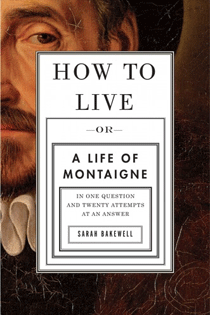By Colin Rafferty
The idea of a biography of Michel de Montaigne seems redundant—after all, this is an author best known not only for writing about himself, but for writing about himself in ways that no one had ever read before—long, discursive explorations of the self that literally gave name to the genre of the essay—or essai, as Montaigne called his attempts to record his life.
And yet, Sarah Bakewell’s How to Live: a Life of Montaigne in One Question and Twenty Attempts at an Answer tackles the problem of a biography of the Renaissance nobleman in a very Montaigne-esque fashion, by surrounding the material of the Essays with fascinating information about Montaigne as more than just author. She chronicles not only the facts of Montaigne’s life, but also his life as French nobility of the 16th century, including his forays into politics (he served as mayor of Bordeaux for two terms), intrigue (he was locked in the Bastille for five hours thanks to his association with Henri de Navarre, and was rescued after Catherine de’ Medici intervened), and property management (Bakewell’s exploration of the Montaigne estate is particularly fascinating). She tracks Montaigne’s own travels across Western Europe, and his reluctance to return to France even when summoned by his town’s governing body.
Strictly limiting herself to biography would be out of the spirit of her subject, so just as his essays were marked by long digressions and rambling introductions (“On Some Verses of Virgil” takes a few dozen pages to get to the promised verses), Bakewell takes advantage of the non-narrative nature of the essay to explore the world around Montaigne, as well as the world before and after him. She considers the three schools of philosophical thought that influenced Montaigne—Stoicism, Epicureanism, and Pyrrhonian Skepticism—and how the Essays reflect a synthesis of all three. She looks at his friendship with Étienne de La Boétie, whose death from the plague in 1563 grieved Montaigne greatly, and whose own writing resembled Montaigne’s enough to make readers wonder if Montaigne was its true author. She considers how the Essays have been regarded and used by generations of readers since Montaigne’s own death, including the 178 years the book spent on the Vatican’s Index of Prohibited Books and Virginia Woolf’s fondness for quoting Montaigne’s idea that “life should be an aim unto itself; a purpose unto itself.” Bakewell tracks carefully how Montaigne’s words have been interpreted over the centuries to serve the needs of his audiences—evidence, she argues, of his brilliance: “All this can happen because the Essays has no great meaning, no point to make, no argument to advance. It does not have designs on you; you can do as you please with it.”
The elasticity of Montaigne’s writing is mirrored in the structure of Bakewell’s biography; rather than following the linear narrative of Montaigne’s life, she breaks the book into twenty-one sections, beginning with the titular question of How to Live? and attempting twenty answers, including Pay attention, Survive love and loss, and Reflect on everything; regret nothing. This structure allows Bakewell to explore the fascinating corners around Montaigne’s life and work, wandering away from her main subject to spend pages on historical and philosophical contexts that enrich our understanding of this remarkably influential author.
This chapter title, the seventeenth attempt at answering Montaigne’s question, lies at the heart of Bakewell’s project. For, she argues, what Montaigne provides to us is less a time capsule from the Renaissance and more a glimpse into our own future and ultimately, into our own selves. By the book’s end, its title has shifted from a question to a statement. Here, Bakewell argues, is Montaigne showing us how to live.
Colin Rafferty (ΦBK, Kansas State University, 1998) teaches nonfiction writing at the University of Mary Washington in Fredericksburg, Virginia. Mary Washington is home to the Kappa of Virginia chapter of Phi Beta Kappa.




